|
|
|
Sort Order |
|
|
|
Items / Page
|
|
|
|
|
|
|
| Srl | Item |
| 1 |
ID:
117877
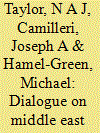

|
|
|
|
|
| Publication |
2013.
|
| Summary/Abstract |
Negotiations on the establishment of a Middle East zone free of biological, nuclear, and chemical weapons and their means of delivery are now at a critical phase after more than three decades of prenegotiations. This article examines the factors that have impeded negotiations in order to identify the key actors whose mutually reinforcing efforts are essential to its establishment. We argue that current efforts to negotiate a zone free of nuclear weapons and other weapons of mass destruction and their delivery systems (WMDFZ) in the Middle East can learn much from the successful negotiation of other nuclear weapons free zones (NWFZs). Nevertheless, the circumstances in the Middle East are unique and require a more holistic approach. Success here will depend largely on a multidimensional perspective that brings together the energies and insights of a range of state and nonstate actors, not least civil society in the Middle East, where confidence and trust building is too complex and demanding a task to be seen as the preserve of political and geostrategic calculation. Enabling the societies and polities of the region to identify areas of mistrust and misunderstanding across strategic, political, but also cultural and religious divides in order to open up possibilities for dialogue and mutual respect holds the key to creating a favorable negotiating environment.
|
|
|
|
|
|
|
|
|
|
|
|
|
|
|
|
| 2 |
ID:
117873
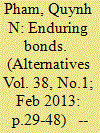

|
|
|
|
|
| Publication |
2013.
|
| Summary/Abstract |
This essay questions assumptions about agency expressed in prevailing concepts of freedom understood as autonomy. It also turns to contexts of bondedness, where one endures and negotiates one's embeddedness in relations of power and thick webs of sociality, to explore alternative modes of agency, of response-ability. The theoretical analysis engages two sites of communal agency, particularly women's: first, I draw from Saba Mahmood's study of the women's mosque movement in contemporary Egypt; and second, I look closely at H? Xuân Huong folk poetry in eighteenth-century Confucian-dominated Vi?t Nam. One can be conceived as a politics of piety, whereas the other can be aptly called a politics of impiety. Both offer glimpses into alternative ways of being and acting in the world. Together they challenge the prevalence of a freedom-centered approach in international relations and political theory.
|
|
|
|
|
|
|
|
|
|
|
|
|
|
|
|
| 3 |
ID:
117872
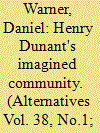

|
|
|
|
|
| Publication |
2013.
|
| Summary/Abstract |
Humanitarian intervention and the responsibility to protect are two examples often used of the separation between humanitarian action and the political. To say that humanitarianism is separate from the political comes from a very particular theological reading. To understand this reading, the article provides a detailed analysis of the life of Henry Dunant, the founder of the ICRC, to show his religious and historical environment in Calvinist Geneva.
|
|
|
|
|
|
|
|
|
|
|
|
|
|
|
|
| 4 |
ID:
117876
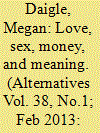

|
|
|
|
|
| Publication |
2013.
|
| Summary/Abstract |
Since the disintegration of the Soviet Union and subsequent collapse of Cuba's centralized economy, pursuing relationships with foreign visitors to the island has emerged as a viable means of accessing hard currency, consumer goods, travel, and emigration-of gaining admittance to a perceived better life. In the mid of escalating state repression, a discursive struggle has materialized, assigning meanings to new sexual identities, problematizing these sexual relations, and creating new objects of disciplinary power. Far from simple semantics, defining and naming allows actors within the field of relations-government, police, journalists, mass organizations, individuals-to situate young Cubans within various binaries including good/bad, right/wrong, virtue/vice. Specific labels ranging from crass (puta or prostituta) to enigmatic (candelero or luchadora) have ebbed and flowed in popular parlance, each loaded with different raced and gendered implications and political commitments. As state governance of bodies and sexualities evolves, this ethnographic study demonstrates that many young Cubans have begun to use bodily and sexual practices as tools to circumvent poverty, resist state dictates on morality and austerity, and create new subjectivities. Language, for its part, has become a major weapon, alternately disciplinary and liberatory, in the struggle for (self-)definition.
|
|
|
|
|
|
|
|
|
|
|
|
|
|
|
|
| 5 |
ID:
117874
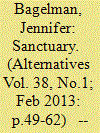

|
|
|
|
|
| Publication |
2013.
|
| Summary/Abstract |
Over the last decade, sanctuary has been evoked as an alternative to the problems associated with an exclusionary statist asylum regime. In Canada, the United States, and Europe, a "cities of sanctuary" movement has emerged, articulated through various political vocabularies. This movement conceives of sanctuary not simply as a church-based site where asylum seekers may be secured but offers a host of welcoming practices within and beyond cities. This article specifically explores the UK-based City of Sanctuary movement, with a focus on the case of Glasgow, which has widely been read as exemplifying hospitality toward an empowerment of asylum seekers. It has been argued that while a statist discourse of fear-a "politics of unease"-posits migrants as a threat to be policed, the City of Sanctuary stimulates a softer approach. Yet, this article illustrates how the City of Sanctuary is also mobilizing a deeply troubling "politics of ease." Based on an ethnographic investigation, I show how a politics of ease renders intractable the serious problem of protracted waiting that many controls many asylum seekers. In doing so, I demonstrate how the seemingly hospitable City of Sanctuary in fact contributes to a hostile asylum regime by indefinitely deferring and even extending a temporality of waiting.
|
|
|
|
|
|
|
|
|
|
|
|
|
|
|
|
|
|
|
|
|